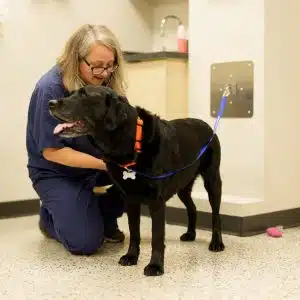New developments in Pet Cancer Surgery techniques
Wiki Article
The Importance of Early Discovery: Insights From a Vet Oncologist
Early discovery of cancer in pets is a necessary subject for pet dog owners and veterinary experts alike. Veterinary oncologists highlight the relevance of identifying refined indicators that might suggest significant health and wellness concerns. Typical symptoms frequently go unnoticed up until they rise. Understanding these very early indication and developments in analysis techniques can make a significant distinction. What steps can pet dog proprietors require to enhance their pets' opportunities of early medical diagnosis and much better therapy end results?Comprehending Cancer Cells in Family Pets: Typical Kinds and Signs And Symptoms
While numerous pet dog proprietors may not recognize it, cancer cells is a substantial health and wellness worry affecting pets, a lot like it does in humans. Common sorts of cancer in pets include lymphoma, pole cell tumors, osteosarcoma, and mammary tumors. These hatreds can show up in various means, depending upon their place and type. Symptoms usually include unusual weight management, relentless vomiting, modifications in appetite, or uncommon lumps and bumps. Animals may additionally display lethargy, problem breathing, or hesitation to workout, which can suggest underlying health concerns. Early indications can be subtle, making it important for family pet owners to be watchful of their family pets' actions and physical condition. Recognizing these usual types and linked symptoms can encourage owners to seek veterinary care quickly, possibly causing earlier diagnosis and treatment choices. Recognizing the indicators of cancer cells in animals is an essential action in the direction of enhancing their health and high quality of life.The Duty of Veterinary Oncologists in Early Detection
Vet oncologists play a vital role in the very early detection of cancer cells in animals, as their specialized training equips them with the skills necessary to identify refined indicators that might be forgotten by family doctors. They utilize a mix of medical know-how and progressed analysis tools to assess individuals thoroughly - Veterinary Cancer Specialist. By acknowledging very early signs and symptoms and threat elements, oncologists can guide animal proprietors toward timely treatments, boosting the opportunities of successful therapyVeterinary oncologists frequently team up with basic specialists to develop screening protocols customized to specific breeds or age groups, enhancing the effectiveness of very early detection efforts. They educate family pet owners on the significance of normal examinations and awareness of adjustments in habits or physical condition. Through these aggressive actions, veterinary oncologists greatly add to improving results for animals detected with cancer cells, stressing the vital nature of their function in vet health care.
Advances in Diagnostic Techniques for Family Pet Cancer Cells
Advancements in analysis strategies have markedly boosted the ability to discover cancer in pet dogs at earlier stages. Techniques such as innovative imaging, consisting of MRI and CT scans, give detailed interior views, allowing veterinarians to recognize tumors that might not be apparent. In addition, the growth of minimally invasive treatments, such as great needle aspirates and biopsies, makes it possible for precise tasting of cells for histopathological examination with lowered stress for the animal.Emerging molecular diagnostics, including hereditary testing and biomarker recognition, are transforming the landscape of veterinary oncology. These methods can identify particular cancer types and anticipate actions to therapy, facilitating personalized treatment strategies. Advancements in laboratory strategies, such as fluid biopsies, are beginning to use non-invasive options for keeping track of growth progression and therapy effectiveness. Jointly, these advancements stand for a considerable jump onward in vet medicine, stressing the essential duty of early discovery in boosting end results for pets diagnosed with cancer.
How Family Pet Owners Can Identify Indication
Just how can pet dog proprietors become vigilant in identifying potential indication of cancer? Understanding of behavioral and physical adjustments in animals is essential. Common indicators consist of unusual sleepiness, loss of cravings, or abrupt weight changes. Pet proprietors need to additionally take note of relentless throwing up or looseness of the bowels, which may signal underlying issues.Changes in the skin, such as swellings, bumps, or sores that do not recover, warrant immediate vet interest. Furthermore, proprietors need to note adjustments in drinking practices, raised urination, or difficulty in breathing. Inexplicable hopping or discomfort may additionally be indicators of more major problems.
Normal vet examinations can assist identify these indication early. By keeping a close observation of their animals' health and wellness and behavior, proprietors can play a key role in early discovery, possibly bring about much better results must cancer be identified. Recognizing these indicators may significantly affect an animal's high quality of life.
The Effect of Early Discovery on Therapy Results
Early detection of cancer Board Certified Veterinary Oncologist in animals plays a necessary duty in establishing therapy outcomes, as it usually allows for a bigger series of healing options. When cancer is detected in its early stages, vets can apply much less intrusive therapies, increasing the likelihood of successful intervention. Early-stage cancers may additionally react much better to chemotherapy or radiation, causing boosted survival rates and overall high quality of life for the pet.Additionally, prompt medical diagnosis assists in a more tailored therapy plan, aligning with the particular needs of the animal. This can include customized drug routines or medical interventions that are less aggressive. Conversely, late-stage discovery usually causes limited choices, extra aggressive treatments, and poorer prognoses. As a result, the value of very early detection can not be overstated; it fundamentally changes the trajectory of therapy, making it critical for family pet proprietors to remain alert for any type of signs of illness in their beloved companions.
Frequently Asked Inquiries

How Can Diet Regimen Influence Cancer Threat in Pet Dogs?
Diet plan considerably affects cancer cells danger in pets, as certain nutrients and food kinds can either advertise or hinder tumor growth. A balanced, nutrient-rich diet regimen might aid minimize the likelihood of creating cancer cells in animals.
Are Certain Types More Prone to Cancer cells?
Specific canine types, such as Golden Retrievers and Fighters, exhibit greater cancer cells sensitivity because of genetic predispositions. Some feline breeds also reveal boosted cancer cells dangers, highlighting the significance of breed-specific wellness recognition amongst pet proprietors.
What Are the Costs Linked With Very Early Cancer Cells Detection?
The expenses associated with very early cancer discovery can differ considerably, including analysis tests, examinations, and potential treatments - Veterinary Oncologist. Spending in these solutions frequently causes much better health and wellness end results, eventually minimizing more extensive future clinical costsCan Vaccinations Protect Against Cancer Cells in Animals?


Vaccines may lower the threat of particular cancers in family pets, specifically those connected to viral infections. However, their effectiveness varies, and animal proprietors need to seek advice from vets for tailored suggestions pertaining to vaccination and cancer cells avoidance methods.
How Commonly Should Pet Dogs Be Screened for Cancer cells?
Family pets should normally be screened for cancer cells yearly, particularly as they mature or if they display risk factors. Regular vet examinations can help recognize potential issues early, improving treatment outcomes and total health management.Early detection of cancer in pet dogs is an important topic for family pet proprietors and vet professionals alike. Early indicators can be refined, making it necessary for pet dog proprietors to be observant of their pet dogs' behaviors and physical problem. Veterinary oncologists play a vital role in the early detection of cancer cells in animals, as their specialized training outfits them with the abilities essential to recognize subtle indicators that might be overlooked by general professionals. By preserving a close monitoring of their pet dogs' health and wellness and actions, owners can play a key duty in early detection, potentially leading to better end results ought to cancer cells be identified. Early detection of cancer in animals plays a vital duty in identifying treatment results, as it usually enables for a wider variety of restorative choices.
Report this wiki page